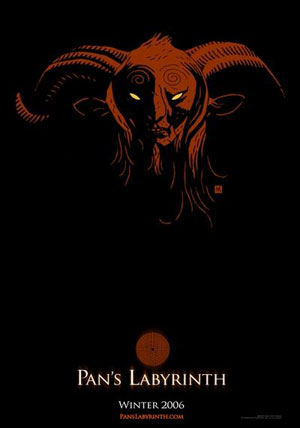Movies /
Movie Reviews
Pan's Labyrinth Movie Review
By Al Kratina
February 6, 2007 - 22:26
Pan's Labyrinth is nominated for an Oscar for Best Original Screenplay, Best Foreign Language Film, Best Achievement in Art Direction, Best Achievement in Cinematography, Best Achievement in Make-Up, and Best Achievement in Music Written for Motion Pictures, Original Score.
The term "fairy tale" implies a very specific type of story. Generally, it involves a princess, a moral lesson, and thanks to children's animation, some variety of animal sidekick singing an Elton John song. But traditionally, fairy tales were much less fey. Back in the days before bloody video games and lax gun control laws, children had to satisfy their violent impulses in ways other than killing hookers in Grand Theft Auto or shooting up their high school, and fairy tales were one way in which those urges were sublimated. They were often brutal, bloody, and bestial, adjectives that could easily be applied to the R-rated Pan's Labyrinth.
Set in the aftermath of the Spanish Civil War, Pan's Labyrinth tells the story of a young girl, whose mother has recently married into the Fascist military leadership. While the mother struggles through a difficult pregnancy in a remote military outpost, the child escapes into a fantasy world of fairies, fauns, and freakishly strong violence. The girl discovers that she's a long lost princess from the underworld kingdom, and must complete several tasks and tests in order to reclaim her throne. Magical sequences such the princess conquering a giant toad in the roots of a fig tree are juxtaposed with scenes of the Captain clubbing someone's face into mush with a whiskey bottle. It's a contrast of fantasy and reality handled in a way that's not often seen in films like this. More complicated than the usual dark versus light comparison, both the fantasy world and the real world are dark, it's just one has a more visceral darkness, and the other a phantasmagoric, gothic darkness, the lyric sheet of a Bal-Sagoth album brought to life.
The performances are all very good, though since it's in Spanish it's somewhat difficult to tell if they're mangling their lines. Ivana Baquero is great as the imaginative little girl, and though Sergi Lopez is a bit over the top as Captain Vidal, for a fairy tale villain he's actually quite subtle, refraining from chewing the scenery unless its particularly delicious. But the tempered, seething performance by Maribel Verdu as Mercedes, a housemaid working as an informer for the anti-fascist resistance, is the highlight in that respect. Director/screenwriter Guillermo Del Toro's script is dreamy without being surreal, fantastical without being childish, and his imaginative creations are brought to life with a masterful mix of computer generated imagery and practical effects. The cinematography brings out the script's darkness without relying too much on underexposure, though a few ill-advised day-for-night scenes occasionally spoil the illusion. While Del Toro needs to learn lessons long forgotten by similar filmmakers like Peter Jackson, like that camera can in fact stay still once in a while, and that the audience can see things even if they're not in overly-dramatic close-up, he keeps things moving, and never lets the style overpower the story. And thankfully, unlike most modern fairy tales, neither are overpowered by an Elton John number.
Rating: 8 /10
Last Updated: January 17, 2025 - 08:20
